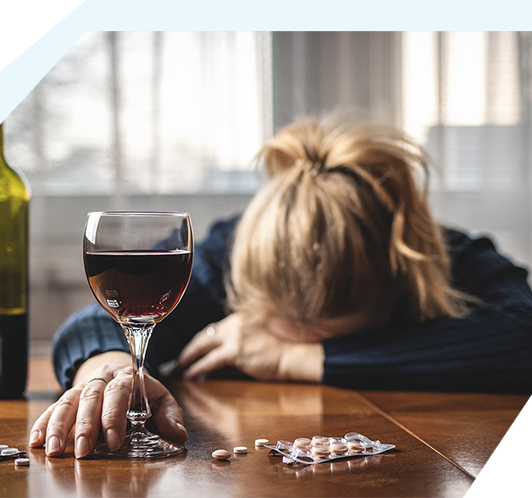
COLLEGE STUDENTS
REHAB, DRUGS & ALCOHOL
College is a difficult time for students
because it challenges them academically
as they prepare for the professional life.
ALCOHOL ADDICTION AMONG COLLEGE STUDENTS
Binge drinking can interfere with all aspects of a personʼs life. Professionals have a hard time dealing with it—and college students suffer even more, because they have no idea how to manage their drinking habits.
Drinking at college is commonly glorified in pop culture, and this image certainly doesnʼt help the case against alcohol abuse. College students are more likely to think it is cool because of what they see on TV or at the movies.
The party culture is pervasive at many colleges and universities, not only because it helps students feel like they belong, it also reduces the stress and pressure that they are going through. Of course, excessive alcohol consumption doesnʼt actually make the body feel good. Itʼs not nearly as glorious as it is depicted on screen. However, trying to duplicate that experience in real life leads to a mentality that drinking means they are having fun


THE PARTY SCENE AND ITS EFFECTS ON THE YOUTH
College social life is more likely to involve alcohol, which in some cases may actually help a studentʼs social life. Drinking casually is something ingrained into culture and is actually celebrated. But excessive drinking is a different story. The party scene in college does not seem to make distinction.
Binge drinking in college may lead students to associate the experience with positive outcomes such as making new friends and feeling less anxious—even when casual drinking could make the same results in a much safer way.
There is also a reward-reinforcing effect caused by intoxication. This is what commonly leads to drinking problems and alcohol use disorder. Students typically benefit from a 30 day rehab program, or longer.
SIGNS OF SUBSTANCE ABUSE IN COLLEGE STUDENTS
Substance abuse is dangerous on so many levels. It affects a person physically, emotionally, mentally, socially, financially, and for some people, spiritually. If someone in the family is abusing drugs or drinking too much, it is important to look for the signs. This way, a solution can be made earlier—before the problem escalates.
It is important to note that the signs and symptoms of drug or alcohol abuse will vary based on the substance. Each person reacts to these things differently. This is why drug addiction treatment is heavily personalized.
Still, there are common psychological patterns that emerge that may be worth looking at, especially among those who are consistently abusing a substance. Personality changes are to be expected, and the student may become more secretive about their activities. Dramatic shifts in behavior may be hard to explain, but it could signal that something is wrong.A college student may be abusing a drug if they display a sudden, drastic change in grades or academic performance. They may have decreased interest in classes and extracurricular activities.
DRUG ABUSE, ALCOHOLISM, AND
ADDICTION: THE STATISTICS
The negative effects of excessive drinking are as serious as they are widespread. It not only affects college students, it affects the rest of the population, as there is currently an opioid crisis affecting the US. However, statistics involving college students are very important because they are most likely to abuse illicit substances as they enter adulthood. Dealing with these problems earlier can help prevent the opioid epidemic from worsening.
According to the National Institute on Alcohol Abuse and Alcoholism, more than 690,000 college students between the ages of 18 to 24 are assaulted by another student who has been drinking. 599,000 receive unintentional injuries while under the influence of alcohol.

